Dates: Aug 23 • Sep 29 • Oct 4 • Oct 5 • Oct 13 • Oct 14-15 • Oct 20 • Oct 20-22 • Oct 26 • Nov 2 • Nov 9 • Nov 17 • Dec 5 & 7
Thu Sep 29, noon
Watch the recording on YouTube 
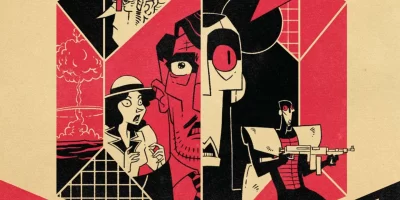 “Work Must Not Cease”: Creating a Comic Adaptation of R.U.R. “Work Must Not Cease”: Creating a Comic Adaptation of R.U.R.
Invited talk: Nick Johnson & Chris Murray (University of Dundee)
Karel Čapek’s play R.U.R. (1920), which gave us the term ‘robot’ and promptly envisaged a robot apocalypse mere pages later, is an oddly compelling mix of satire, science fiction, comedy, and tragedy. It’s a play about being trapped by the roles that others set for us. Society is a machine that produces beings every bit as programmed and restricted as the biomechanical robots that emerge from the factories.
A century after the play was written, Chris Murray and Nick Johnson have produced a comics adaptation of the play. Murray, who wrote the comic, is Professor of Comics Studies at the University of Dundee, Scotland, and Director of the Scottish Centre for Comics Studies. Johnson, an artist and graduate of the Comics Masters programme at the University of Dundee, created the artwork for the comic. Join Chris and Nick as they discuss the process of adapting the play into a comic. They will explore the various choices that shaped their adaptation, and how the comic is in dialogue with Čapek’s play and its legacy. |
Tue Oct 4, 7pm
In-person at Rozsa Center
“When his young daughter’s beloved companion — an android named Yang — malfunctions, Jake (Colin Farrell) searches for a way to repair him. In the process, Jake discovers the life that has been passing in front of him, reconnecting with his wife (Jodie Turner-Smith) and daughter across a distance he didn’t know was there.”
[A24 Films]
Post-performance discussion: Alexander Weinstein (Siena Heights University), author of the story “Saying Goodbye to Yang” that inspired After Yang |
Wed Oct 5, noon
Watch the recording on YouTube 
 Robots, Compassion, Love, and Human Resilience in the Technological Hyper-Age Robots, Compassion, Love, and Human Resilience in the Technological Hyper-Age
Invited talk: Alexander Weinstein (Siena Heights University)
Author Alexander Weinstein will discuss how speculative fiction can help us make sense of our dystopian realities, the dangerous allure of robots and AI, and the ways that he uses real life experiences to inform the futuristic landscapes of his fiction. |
Thu Oct 13, noon
Watch the recording on YouTube 
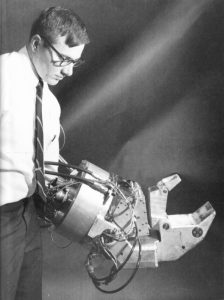 R.U.R.’s Robot Rebellion: Cybernetics Lineages and Cultural Legacies R.U.R.’s Robot Rebellion: Cybernetics Lineages and Cultural Legacies
Invited talk: Heather Love (University of Waterloo)
Professor Heather A. Love traces a lineage from the robot rebellion in Karel Čapek’s cautionary 1921 play R.U.R. to the cybernetic machines developed by the likes of Norbert Wiener during WWII; and she explores the enduring legacy of this imagined narrative within contemporary media and tech culture.
This program is partially funded/sponsored by the Visiting Professor Program, which is funded by a grant to the Office of the Provost from the State of Michigan’s King-Chavez-Parks Initiative. |
Fri-Sat Oct 14-15, 7:30PM
 Tech Theatre Company performance: R.U.R. Tech Theatre Company performance: R.U.R.
Sat 15 Oct: post-performance discussion
R.U.R. (Rossum’s Universal Robots) imagines a world in which synthetic humanoid beings perform virtually all work previously done by humans. This change has a profound effect on the human race (the birth rate plunges as people struggle with a lack of purpose), and the robots themselves begin to perceive their own worth and rights as sentient beings. Eventually they lash out against their human oppressors in a violent rebellion. The play ends with a pair of robots discovering love, suggesting a return of compassion to the world. |
Thu Oct 20, noon
Watch the recording on YouTube 
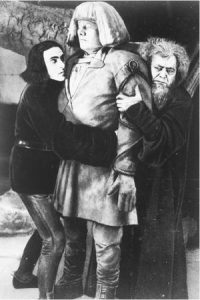 Golems, Robots, Workers: Karel Čapek’s R.U.R. and Its Contexts Golems, Robots, Workers: Karel Čapek’s R.U.R. and Its Contexts
Invited talk: Jindrich Toman (University of Michigan)
The talk first shows that many themes of R.U.R. were present already in a short story “The System” that Karel Capek wrote with his brother Josef in 1908. Obviously, by 1920 many things have changed and so R.U.R. shows an interesting metamorphosis of characters and motifs that point beyond the 1908 story, One of the new factors is the popularity of artificial creatures, including another Prague product—the Golem, best known from Paul Wegener’s Golem film of 1920. Differences and convergences of R.U.R. and Wegener’s film will be discussed in an attempt to sketch the context provided by the period and to show Capek’s originality. |
Thu-Sat Oct 20-22, 7:30PM
 Tech Theatre Company performance: R.U.R. Tech Theatre Company performance: R.U.R.
|
Wed Oct 26, noon
Watch the recording on YouTube 
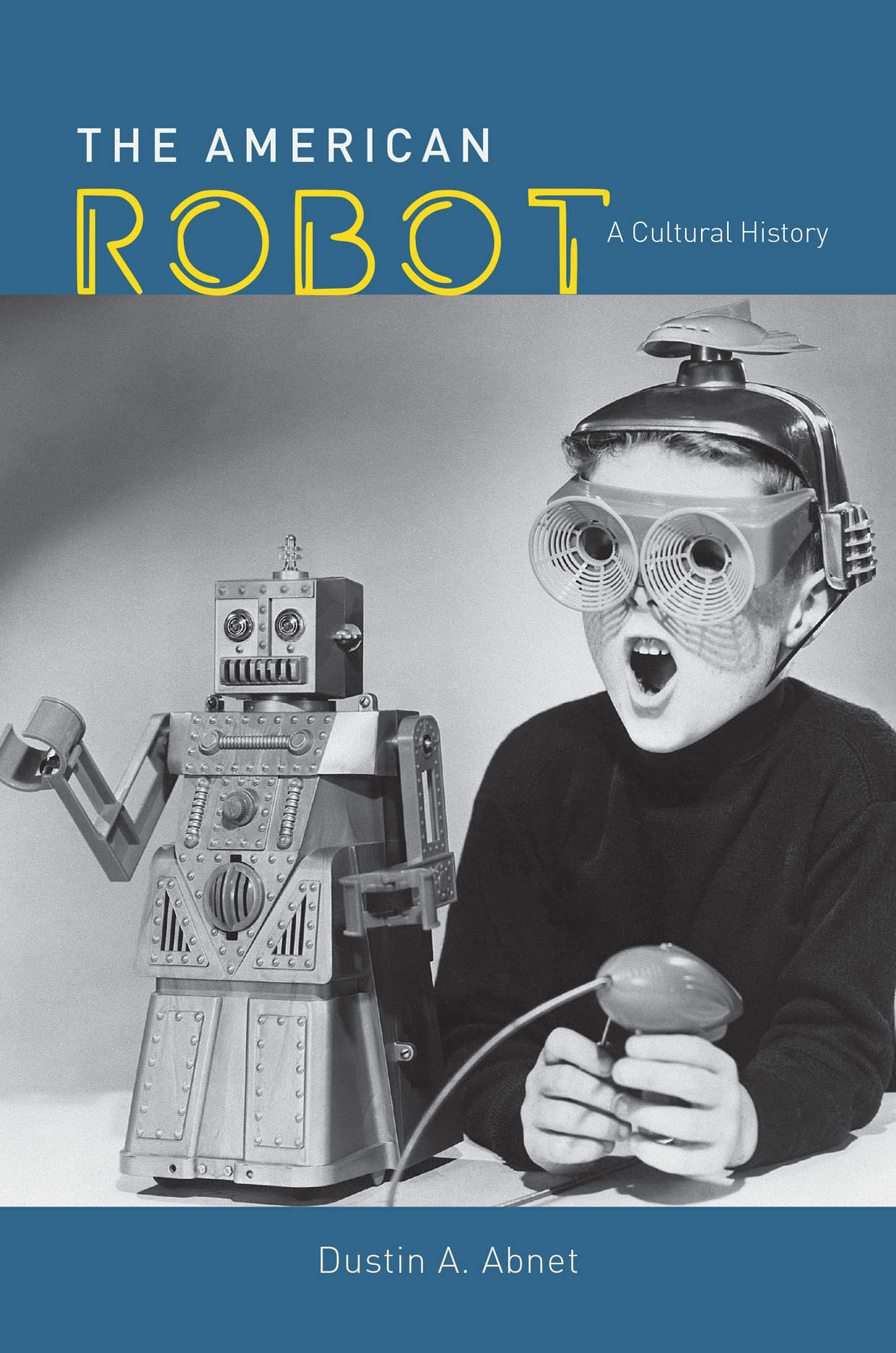 Americanizing the Robot: Westinghouse Electric and the Rise of a Global Consumer Icon Americanizing the Robot: Westinghouse Electric and the Rise of a Global Consumer Icon
Invited talk: Dustin Abnet (Cal State Fullerton)
Between the 1921 premier of Karel Čapek’s R.U.R. (Rossum’s Universal Robots) and the explosion of the robot’s popularity in the 1950s, the idea of the robot underwent a startling transformation. Largely thanks to the advertising efforts of Westinghouse Electric Company, Čapek’s character traded its organic body for one made of metal, lost much of its connotations of class rebellion, and increasingly symbolized the utopian possibilities of consumer capitalism rather than its dangers. Instead of satirizing industrial life, the now-tamed robot became, in post-World War II American culture, the key to its success. This talk explores how that happened, how American corporations, the press, and science fiction writers transformed the robot from a creature of nightmares into a tool of consumerist dreams. |
Wed Nov 2, noon
Watch the recording on YouTube 
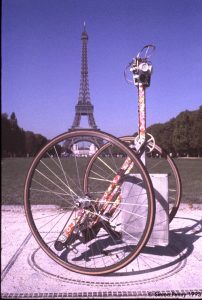 Robotic Art as critical intervention: Petit Mal Robotic Art as critical intervention: Petit Mal
Invited talk: Simon Penny (University of California-Irvine)
Over 1989-95, I designed and built an eccentric but robust interactive robotic artwork called Petit Mal. It was a robot you could dance with. It functioned as an interactive amusement, but discursively, it took part in debates around AI and Artficial Life (AL), and ‘bottom-up’ robotics. It also took a pioneering role in the development of autonomous sensor based real-time computaional systems that engaged users in embodied interaction. There was no ‘off-the-shelf’ technology, all parts of the work were fabricated and developed from basic components, electronic, mechanical and structural. |
Wed Nov 9, noon
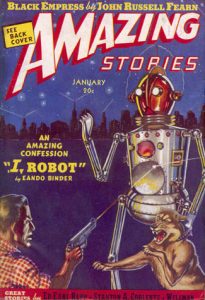 The Robot Plot The Robot Plot
Panel discussion: Stephanie Carpenter, Erin Smith, and Dana van Kooy (MTU-Humanities)
Michigan Tech faculty in literature, creative writing, and film studies discuss the stories we tell time and again about robots. Why do we tell these stories? In what ways do they inform and possibly limit our understanding of humans and technology? Are there other robot stories we should be telling?
In addition, students from the Robotic Systems Enterprise will demonstrate connections between scenes in Klara and the Sun and technical challenges in robot perception. |
Thu Nov 17, noon
In-person at MUB Ballroom A, or register for Zoom webinar:
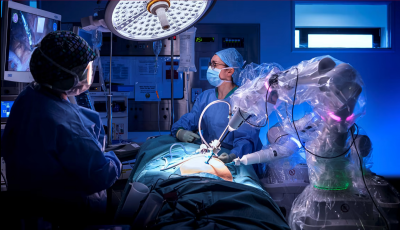 Caution: Robots at Work Caution: Robots at Work
Panel discussion: Jason Archer (MTU-Humanities), Tan Chen (MTU-Electrical & Computer Engineering), Vinh Nguyen (MTU-Mechanical Engineering-Engineering Mechanics)
Robots are radically redefining our conception of the workplace and the nature of work. Three new Michigan Tech faculty members discuss their research on robots at work—work with humans, work with other robots— in a variety of settings including healthcare and manufacturing. What are the opportunities, challenges, and risks of robots in the workforce? |
Mon Dec 5 / Wed Dec 7, 9am & 11am
9am: In-person at U.J. Noblet Forestry Building Atrium
11am: In-person at Wadsworth Hall G42W
Student Poster Sessions
First-year students in the MonsterComp and Read/Write/Engage courses have been focusing on issues surrounding robots. The students will present posters covering texts from the course syllabus as well as their own independent research. |

 “Work Must Not Cease”: Creating a Comic Adaptation of R.U.R.
“Work Must Not Cease”: Creating a Comic Adaptation of R.U.R. Film screening:
Film screening:  Robots, Compassion, Love, and Human Resilience in the Technological Hyper-Age
Robots, Compassion, Love, and Human Resilience in the Technological Hyper-Age R.U.R.’s Robot Rebellion: Cybernetics Lineages and Cultural Legacies
R.U.R.’s Robot Rebellion: Cybernetics Lineages and Cultural Legacies Tech Theatre Company performance:
Tech Theatre Company performance:  Golems, Robots, Workers: Karel Čapek’s R.U.R. and Its Contexts
Golems, Robots, Workers: Karel Čapek’s R.U.R. and Its Contexts Americanizing the Robot: Westinghouse Electric and the Rise of a Global Consumer Icon
Americanizing the Robot: Westinghouse Electric and the Rise of a Global Consumer Icon Robotic Art as critical intervention: Petit Mal
Robotic Art as critical intervention: Petit Mal The Robot Plot
The Robot Plot
 Caution: Robots at Work
Caution: Robots at Work